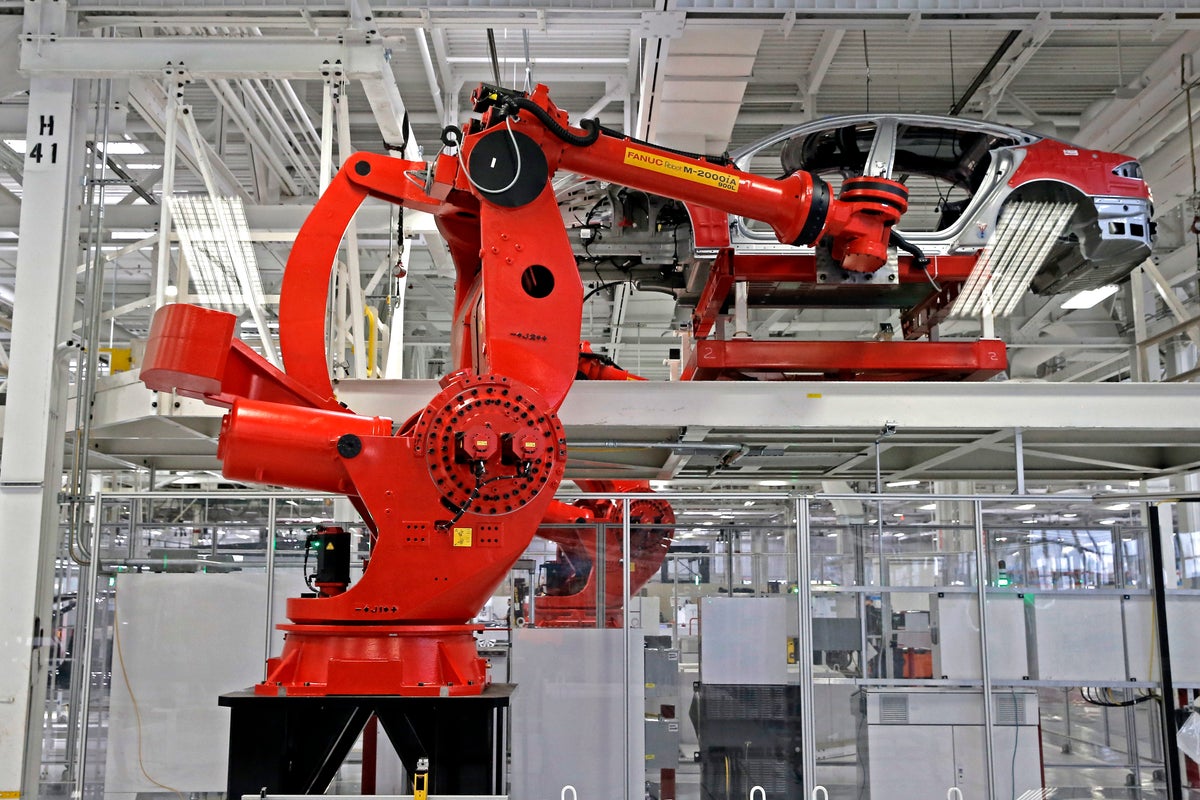A robotics technician at Tesla’s troubled Fremont, California, manufacturing plant is suing the Elon Musk-owned automaker for $51 million after he says an out-of-control robot suddenly struck him without warning, leaving the 50-year-old employee grievously injured and struggling to pay astronomical medical bills.
Peter Hinterdobler was helping an engineer disassemble the robot, which had been moved from its usual position on the Model 3 production line, according to a civil complaint obtained by The Independent.
“While the engineer attempted to remove the motor at the base of the robot in order to access its internal dress pack, the robot’s arm suddenly and without warning released with great force,” the complaint states. “The release involved both the robotic arm’s own power and the force of an approximately 8,000-pound counterbalance weight.”
The arm slammed into Hinterdobler “with substantial force, causing him to be thrown to the floor and to lose consciousness, among other injuries,” according to the complaint.
To date, Hinterdobler’s injuries stemming from the harrowing July 22, 2023 incident have cost him $1 million in medical expenses, with at least another $6 million to come, according to a statement of damages attached to the complaint. In all, he is seeking $20 million for pain, suffering, and inconvenience, $10 million for emotional distress, $1 million for loss of earnings thus far, plus $8 million for loss of future earning capacity, as well as $5 million for past and future loss of household services.
Hinterdobler’s attorney told The Independent that the figures are subject to change.
Tesla and robotics firm FANUC are named as defendants in the suit, which was initially filed in California state court last month and moved to Oakland federal court on August 19. Neither responded Monday to The Independent’s requests for comment.
In 2021, a Tesla engineer at the carmaker’s Austin, Texas, Gigafactory was reportedly “attacked” by a robot that dug its claws into his back and arm, pinning the employee against a wall. The worker managed to escape the robot’s clutches when a coworker hit the emergency stop button, but fell down a chute meant for scrap metal, “leaving a trail of blood behind him,” one witness told regulators.
The first serious robot-related industrial accident in the United States occurred in 1979, when a worker at a Ford plant in Flat Rock, Michigan, died after being hit in the head by a robotic arm. Since then, as robots become more commonplace in manufacturing, injuries and deaths have risen steadily, according to a 2024 study.
Data from the Occupational Safety and Health Administration shows dozens of severe injuries linked to industrial robots, under headings such as: “Employee Is Killed When Crushed By Spot Welding Robot,” “Employee Incurs Concussion When Struck In Head By Robot,” “Worker Sustains Fractured Hip When Struck By Robot,” and, “Employee Killed When Robot Pinned His Neck.”
FANUC has been sued previously over gruesome allegations involving its robots. In 2015, a maintenance engineer at a Michigan car parts factory was killed when a FANUC robot unexpectedly trapped her and crushed her skull.
Hinterdobler’s complaint contends the robot had been placed in an “area not designated for such equipment,” and that Tesla subsequently “implemented new rigging and safety protocols specifically related to the… robot involved in [Hinterdobler’s] injury.”
At the same time, Hinterdobler alleges Tesla has denied him access to video footage of the incident, despite repeated demands.
Tesla’s Model Y, Model S, Model 3 and Model X lines are manufactured at the company’s 22,000-person Fremont factory, where Hinterdobler worked. The U.S. Equal Employment Opportunity Commission sued Tesla in 2023 over allegations of unbridled racism at its Fremont plant.
This spring, Tesla settled a lawsuit brought by a Black employee at the Fremont facility who accused a manager of greeting her by saying, “Welcome to the plantation,” and, “Welcome to the slave house.”
A lawsuit filed last month by the former head of security at the Fremont facility laid out a slew of bombshell allegations, including sexual assaults aboard company shuttle buses, cocaine use onsite, physical brawls breaking out between employees and “prevalent” bigotry – including widespread use of the “N-word.”
According to Hinterdobler’s complaint, Tesla “owed [him] a duty to use reasonable care in the ownership, operation, maintenance, supervision, training, inspection, repair, alteration, development, design, manufacture, warning and use of the FANUC robot” that allegedly injured him.
“This duty included but was not limited to compliance with industry standards, safety standards, statutes, ordinances, and regulations designed to promote workplace safety and prevent injuries of the type suffered by [Hinterdobler],” the complaint states.
Additionally, Hinterdobler’s complaint says Tesla is responsible for “failing to ensure that the robot was safely de-energized, secured, and stable before allowing [Hinterdobler] to assist with the disassembly process.”
It claims FANUC is liable for “negligently designing” the robot in question, failing to properly instruct users about safe operation, and further alleges the robot “failed in a dangerous and unexpected manner.”
Hinterdobler is asking for general, punitive, and exemplary damages, plus special damages for lost earnings, medical expenses, and loss of earning capacity, as well as attorneys’ fees and court costs, to be determined by a jury.
Tesla and FANUC have not yet filed formal answers to Hinterdobler’s allegations.

